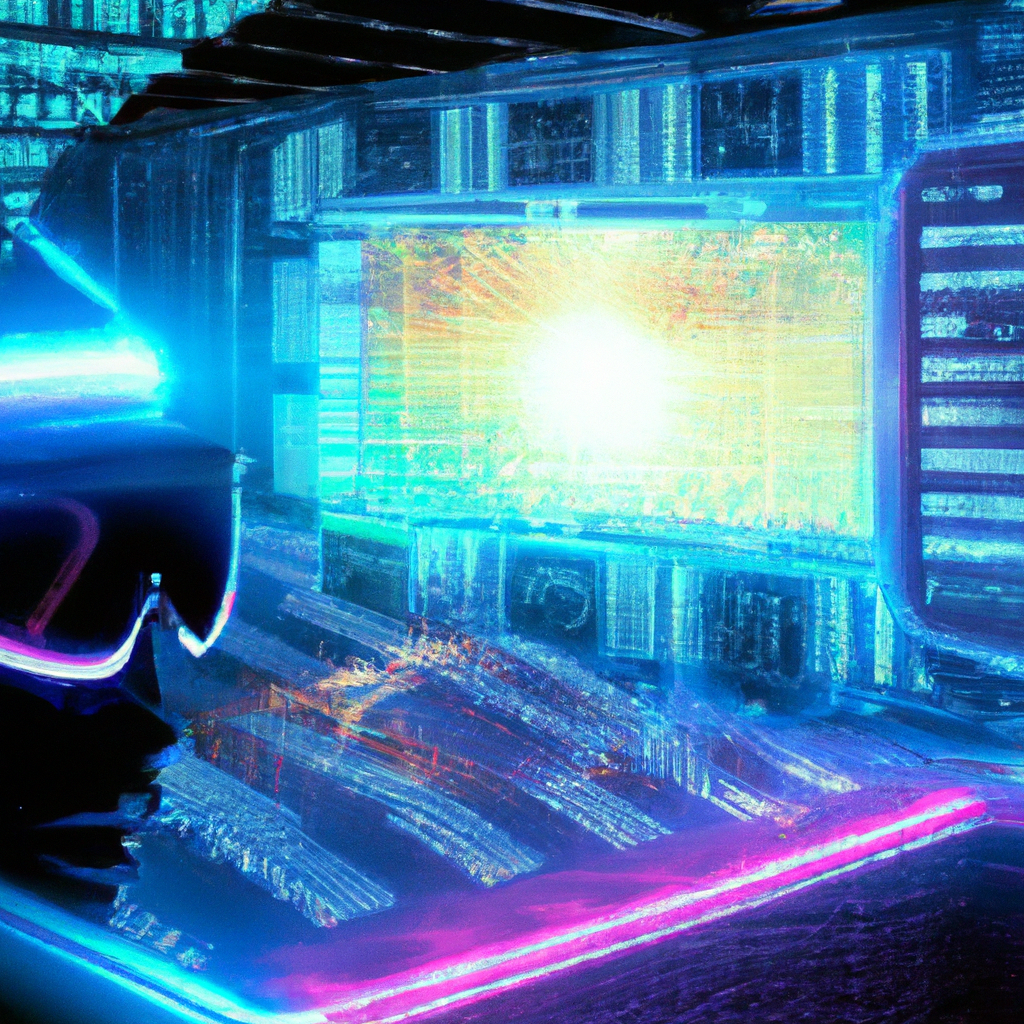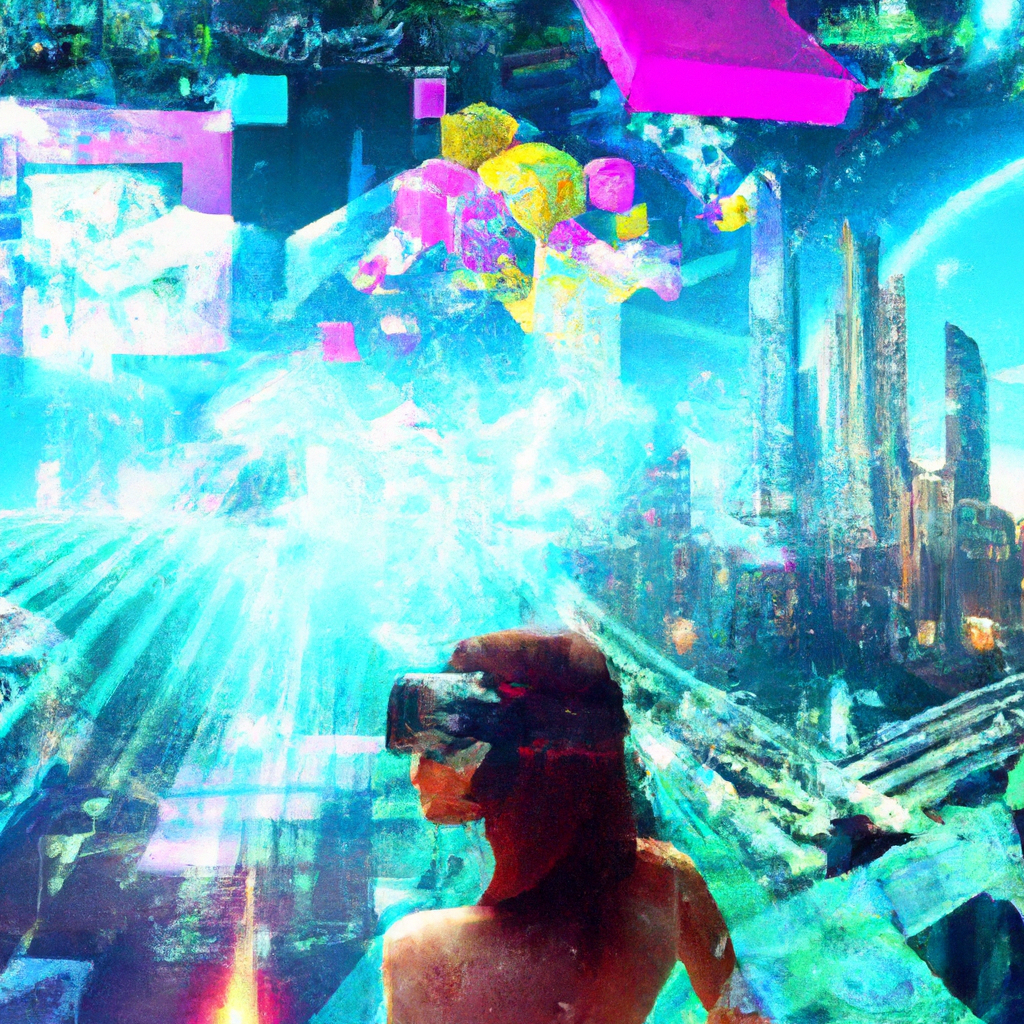The Future of AI Game Development to Make Money

Have you ever dreamed of making money online while indulging in your passion for gaming? Well, look no further because AI game development could be the perfect avenue for you! In this article, we will explore the exciting world of AI game development and how it can be a lucrative business opportunity for those willing to hop on board.
Whether you’re an avid gamer looking to monetize your skills or an entrepreneur searching for a profitable niche, this article will provide you with all the necessary insights and tips to start earning money online through AI game development. So get ready to level up your income with this exciting and innovative venture!
The Basics of AI Game Development
Understanding AI Game Development
AI game development refers to the process of creating and designing video games that incorporate artificial intelligence (AI) technology. In AI game development, developers use algorithms and programming to create lifelike characters, realistic environments, and challenging gameplay. The goal is to make the game more immersive and engaging for the players.
AI Game Development Tools and Software
To develop AI games, developers can utilize a variety of tools and software. These tools provide features and functionalities that make it easier for developers to implement AI into their games. Some popular AI game development tools include Unity, Unreal Engine, and Godot. These tools offer a range of functions, such as AI behavior scripting, pathfinding algorithms, and physics simulation.
Key Skills Required for AI Game Development
Developing AI games requires a combination of technical skills and creative abilities. The key skills that are essential for AI game development include programming languages such as C++, Python, or Java, as well as proficiency in AI techniques like machine learning and natural language processing. Additionally, a strong understanding of game mechanics, level design, and user experience is crucial for creating enjoyable and challenging gameplay.
Ways to Monetize AI Games
In-App Purchases and Virtual Goods
One of the most popular ways to monetize AI games is through in-app purchases and virtual goods. In-app purchases allow players to buy additional content or unlock special features within the game. Virtual goods, on the other hand, can range from cosmetic items like skins or costumes to power-ups and enhancements. By offering valuable and desirable virtual goods, developers can generate revenue from players who are willing to spend money to enhance their gaming experience.
Advertising and Sponsorships
Another common monetization strategy for AI games is through advertising and sponsorships. Developers can incorporate advertisements into their games, either through banners, interstitial ads, or rewarded videos. By partnering with advertisers or sponsors, developers can receive payment for displaying these ads to their players. It is important, however, to strike a balance between ads and gameplay, as overwhelming players with excessive ads can lead to a negative user experience.
Subscription Models
Some AI games adopt a subscription model, where players pay a recurring fee in exchange for ongoing access to exclusive content, features, or premium benefits within the game. This approach can provide developers with a steady stream of revenue and create a sense of loyalty among subscribers. To attract and retain subscribers, developers need to continuously offer valuable updates and rewards to ensure that players feel they are getting their money’s worth.

Building Your AI Game Development Team
Roles and Responsibilities in AI Game Development
Building a successful AI game development team requires a clear understanding of the different roles and responsibilities involved. The key roles typically found in an AI game development team include game designers, programmers, artists, and quality assurance testers. Game designers are responsible for creating the overall concept and gameplay mechanics, while programmers bring the game to life by implementing the AI algorithms and functionalities. Artists are in charge of the visual elements, including characters, environments, and animations, while quality assurance testers ensure that the game is bug-free and provides a seamless experience.
Finding and Hiring AI Game Developers
Finding and hiring skilled AI game developers can be a challenging task. It is important to look for candidates with a strong understanding of AI techniques and game development principles. Networking within the game development community, attending industry events, and posting job listings on specialized platforms can help in finding potential candidates. When reviewing resumes and portfolios, consider projects that demonstrate expertise in AI and gaming, as well as a collaborative mindset.
Collaborating with Artists and Designers
Collaboration between AI game developers, artists, and designers is essential for creating a cohesive and visually appealing game. Developers should communicate their AI requirements and constraints to artists and designers, who can then create assets that align with the game’s vision. Regular meetings and brainstorming sessions can help foster collaboration, allowing all team members to contribute their ideas and expertise to create an immersive gameplay experience.
Choosing the Right AI Game Genre
Popular AI Game Genres
When choosing an AI game genre, it is important to consider the preferences and trends of the target audience. Some popular AI game genres include strategy games, role-playing games (RPGs), adventure games, and simulation games. Strategy games often incorporate AI elements to create challenging opponents or intelligent decision-making. RPGs use AI to enhance the behavior and interactions of non-player characters (NPCs). Adventure games leverage AI to create dynamic and unpredictable environments, while simulation games use AI to simulate real-world processes and behaviors.
Analyzing Market Trends and Audience Preferences
To ensure the success of an AI game, it is crucial to analyze market trends and audience preferences. Conducting market research, studying competitor games, and analyzing player feedback can provide insights into what types of AI games are currently popular and in demand. Understanding the target audience’s preferences, demographic, and gaming habits can help developers tailor their AI game to meet the needs and expectations of their potential players.
Creating Unique and Engaging Gameplay
Differentiating an AI game from others in the market requires creating unique and engaging gameplay. Developers should focus on incorporating AI elements that enhance the player’s experience and set their game apart. This could include implementing intelligent enemy behaviors, adaptive difficulty levels, or advanced decision-making systems. By offering a fresh and innovative gameplay experience, developers can attract and retain a larger player base.

Creating AI Game Characters and Worlds
Designing Memorable AI Game Characters
Designing memorable AI game characters involves creating realistic and engaging personas that players can connect with. Consider the personality traits, motivations, and visual appearance of the characters. AI can be used to make characters react and respond in realistic and dynamic ways, giving players the feeling of interacting with lifelike entities. Incorporating AI algorithms, such as emotion recognition or dialogue generation, can add depth to the characters and make the game more immersive.
Developing Interactive AI Game Worlds
Creating interactive AI game worlds involves designing environments that respond intelligently to the player’s actions. This can include dynamic weather systems, destructible environments, or interactive objects. AI can be used to simulate realistic physics, create lifelike non-player characters, or generate randomized events. By developing interactive game worlds, developers can provide players with a sense of agency and create immersive and engaging gameplay experiences.
Balancing Realism and Fantasy
Striking a balance between realism and fantasy is key when creating AI game characters and worlds. While realism can enhance immersion and authenticity, there is often a need for elements of fantasy and imagination to create unique and compelling experiences. It is important to consider the target audience and their expectations, as well as the overall theme and tone of the game. By carefully balancing realism and fantasy, developers can create AI game worlds that captivate players and keep them coming back for more.
Implementing AI Technologies in Games
Integrating Machine Learning Algorithms
Integrating machine learning algorithms into AI games allows for intelligent and adaptive gameplay experiences. Machine learning algorithms can be used to train AI models that learn from player behavior and adapt the game’s difficulty level accordingly. This creates a personalized and challenging experience for each player. Developers can also use machine learning algorithms to create smart enemy behaviors, generate diverse NPC dialogue, or predict player preferences.
Utilizing Natural Language Processing
Natural language processing (NLP) can be employed to enhance the player’s interaction with AI game characters. By implementing NLP algorithms, developers can enable AI characters to understand and respond to player input in a more natural and conversational manner. This can range from simple chatbots to more sophisticated dialogue systems. NLP can also be used to analyze and interpret player feedback and sentiment, allowing developers to improve game mechanics and address player concerns.
Applying Computer Vision
Computer vision technology can be utilized to create visual recognition and analysis in AI games. By implementing computer vision algorithms, developers can enable AI characters to recognize objects, faces, or gestures, and react accordingly. This can enrich the gameplay experience by allowing players to interact with the game using gestures or by incorporating real-world objects into the game. Computer vision can also be used for facial animation, enabling AI characters to display realistic emotions and expressions.

Testing and Quality Assurance in AI Game Development
Importance of Testing AI Game Mechanics
Testing AI game mechanics is crucial to ensure a smooth and enjoyable gameplay experience. AI algorithms can be complex, and thorough testing is necessary to identify and fix any bugs, glitches, or balancing issues. Testing should cover all aspects of the game, including AI behavior, character interactions, and environmental responses. It is important to consider different player scenarios and edge cases to ensure that the AI performs as intended in diverse gameplay situations.
Automated Testing Tools for AI Games
To streamline the testing process, developers can leverage automated testing tools specifically designed for AI games. These tools can simulate player behavior, generate test cases, and evaluate the AI’s performance against predefined metrics. Automated testing can help identify AI-related issues more efficiently and reduce the time and effort required for manual testing. It is essential to regularly update and optimize the automated testing scripts as the game evolves and AI algorithms are refined.
User Feedback and Iterative Improvements
In addition to formal testing, gathering user feedback is a valuable way to identify areas for improvement in AI games. Encouraging players to provide feedback through surveys, forums, and social media can provide insights into their experiences and help prioritize areas for iterative improvements. Developers should actively listen to player feedback, monitor reviews, and engage with the player community to ensure that the AI game meets their expectations and provides an enjoyable and engaging experience.
Marketing and Promoting AI Games
Creating a Captivating Game Trailer
Creating a captivating game trailer is essential for marketing and promoting AI games. The trailer should showcase the unique features and gameplay elements of the AI game, capturing the attention of potential players. It should highlight the AI technologies and their impact on the gameplay experience. Visuals, sound effects, and storytelling should be carefully crafted to create excitement and generate curiosity among the target audience.
Engaging with Social Media Influencers
Leveraging the influence of social media influencers can greatly boost the visibility and reach of AI games. Identifying influencers who have a significant following within the target audience and a genuine interest in gaming can be beneficial. Collaborating with influencers to promote the AI game through gameplay videos, live streams, or sponsored posts can generate buzz and attract new players. It is important to choose influencers that align with the game’s values and audience to ensure a genuine and impactful partnership.
Utilizing App Store Optimization
App Store Optimization (ASO) is crucial for improving the discoverability and visibility of AI games in app stores. Optimizing the game’s title, description, keywords, and visuals can significantly impact its ranking and overall download rates. Developers should conduct keyword research to identify relevant and high-ranking search terms, and strategically incorporate them in the game’s metadata. Regularly monitoring and optimizing the game’s ASO strategy based on analytics and user feedback can help maintain a steady flow of organic downloads.

Dealing with Monetization Challenges
Addressing User Resistance to Advertisements
User resistance to advertisements can be a challenge in monetizing AI games. Intrusive or excessive ads can disrupt the gameplay experience and drive players away. To address this, developers should aim for a balanced and non-intrusive approach to advertising. Offering players control over the frequency and type of ads they are exposed to, such as opt-in rewarded videos, can enhance their overall satisfaction. Additionally, providing ad-free options for a premium price can be an attractive alternative for players who prefer an uninterrupted gaming experience.
Optimizing In-App Purchases and Pricing
Optimizing in-app purchases and pricing is crucial to maximize revenue from AI games. Developers should carefully design their virtual goods and in-app purchase offers to provide value and enhance the player’s experience. Offering a variety of price points and packages can accommodate different player preferences and budgets. Regularly analyzing sales data and adjusting pricing and offers based on player behavior and feedback can help optimize monetization strategies and increase conversion rates.
Staying Competitive with Free-to-Play Games
Free-to-play games, which offer the game for free and monetize through in-app purchases or advertisements, have become increasingly popular in the gaming industry. To stay competitive, developers of AI games need to carefully consider their monetization strategy and ensure that players perceive the value in paying for virtual goods or premium features. By providing regular updates, engaging gameplay experiences, and outstanding customer support, developers can create a loyal player base that supports the game’s monetization efforts.
Expanding Your AI Game Development Business
Scaling Up and Developing Sequels
Once an AI game has gained success, developers have the opportunity to scale up their business and develop sequels or expansions. Building on the success of the original game, sequels can leverage the existing player base and brand recognition. Developers can introduce new AI technologies, gameplay mechanics, and visual enhancements to create a fresh and exciting experience for players. Careful planning and market research are crucial to ensure that the sequels meet the expectations of the existing player community and attract new players.
Exploring Cross-Platform Development
Cross-platform development allows AI games to reach a broader audience by being available on multiple platforms such as mobile, PC, and consoles. By developing games that can be played seamlessly across different devices and operating systems, developers can maximize the game’s potential reach and revenue. However, it is important to consider the unique features and limitations of each platform and optimize the game accordingly to provide the best possible experience to all players.
Licensing and Partnerships
Licensing the intellectual property of AI games or partnering with other companies can provide additional revenue streams and opportunities for business expansion. Licensing the AI game’s characters, assets, or storylines to other developers or merchandise manufacturers allows for the monetization of the game’s brand and recognition.
Partnering with other companies, such as retailers or media outlets, can help promote the AI game and reach new audiences. Carefully considering the potential partners and focusing on win-win collaborations can lead to mutually beneficial partnerships.
In conclusion, AI game development offers a range of opportunities for individuals to start a business and earn money online. By understanding the basics of AI game development individuals can pave their way to success in the competitive world of AI game development.

FAQ
What is AI game development?
AI game development refers to the process of creating and integrating artificial intelligence systems into video games. It involves designing intelligent characters, developing algorithms, and implementing behaviors that mimic human-like decision-making within the game environment.
Why is AI important in game development?
AI is important in game development because it enhances the gaming experience by creating more dynamic and unpredictable gameplay. It allows for more intelligent and adaptive non-player characters (NPCs), realistic opponent behavior, procedural content generation, and improved game mechanics.
What are some common applications of AI in game development?
Common applications of AI in game development include creating intelligent NPCs, implementing enemy behavior, designing adaptive difficulty levels, generating realistic environments, and developing procedural content such as maps, quests, or puzzles.
What programming languages are commonly used in AI game development?
Common programming languages used in AI game development include C++, C#, Python, and Lua. These languages have libraries and frameworks that provide support for building AI systems and can be easily integrated with popular game engines.
What are some AI techniques used in game development?
Some AI techniques used in game development include pathfinding algorithms, behavior tree systems, finite state machines, decision-making algorithms (such as minimax or utility-based systems), machine learning, and neural networks. These techniques help create intelligent and interactive game experiences.
How does AI contribute to player experience in games?
AI contributes to player experience by providing more immersive and challenging gameplay. It allows for unpredictable and adaptive behavior from NPCs or opponents, creating a more realistic and engaging gaming environment. AI can also assist players by providing tutorials, hints, or intelligent companions in single-player games.
What challenges are involved in AI game development?
Challenges in AI game development include designing AI systems that are not too predictable or too difficult, optimizing performance for real-time decision-making, creating balanced and fair gameplay, and avoiding issues like AI exploits or behavior anomalies. Development teams must also consider the computational resources required for AI systems within the game’s technical constraints.
Are there any game development engines/frameworks that offer AI functionality?
Yes, several game development engines and frameworks offer built-in AI functionality or seamless integration with AI tools. Examples include Unity, Unreal Engine, Godot, CryEngine, and Panda3D. These engines provide libraries, APIs, and visual scripting systems that facilitate the implementation of AI in game development.
What skills are needed for AI game development?
Skills needed for AI game development include a solid understanding of programming languages, algorithms, and data structures. Additionally, knowledge in areas such as machine learning, pathfinding, behavior modeling, and game design principles can greatly contribute to AI development in games.
Are there any resources available to learn AI game development?
Yes, there are various resources available to learn AI game development. Online tutorials, video courses, books, and forums dedicated to game development and AI can provide valuable learning material. Additionally, many universities and online platforms offer specialized AI courses or game development programs that cover AI techniques in games.
